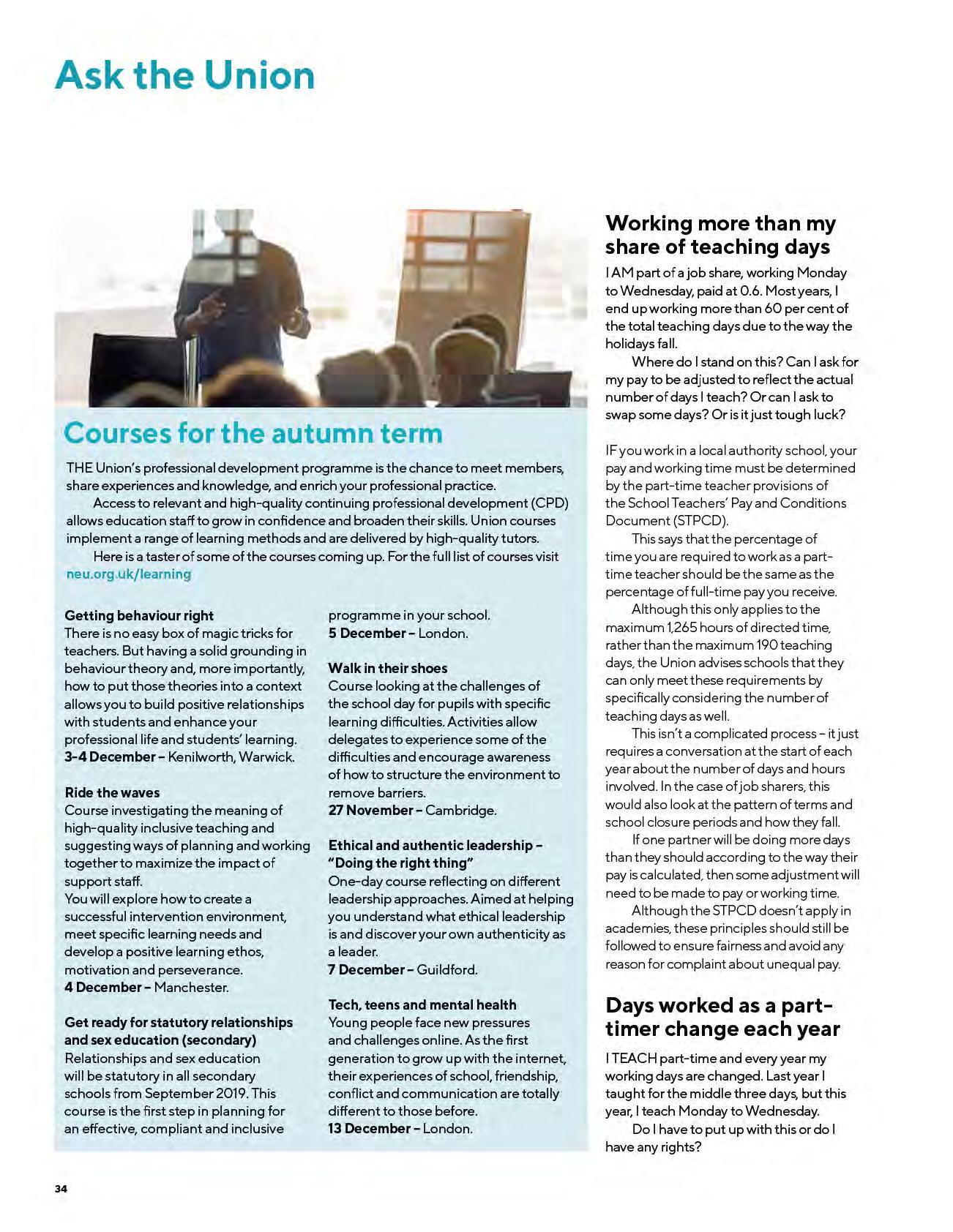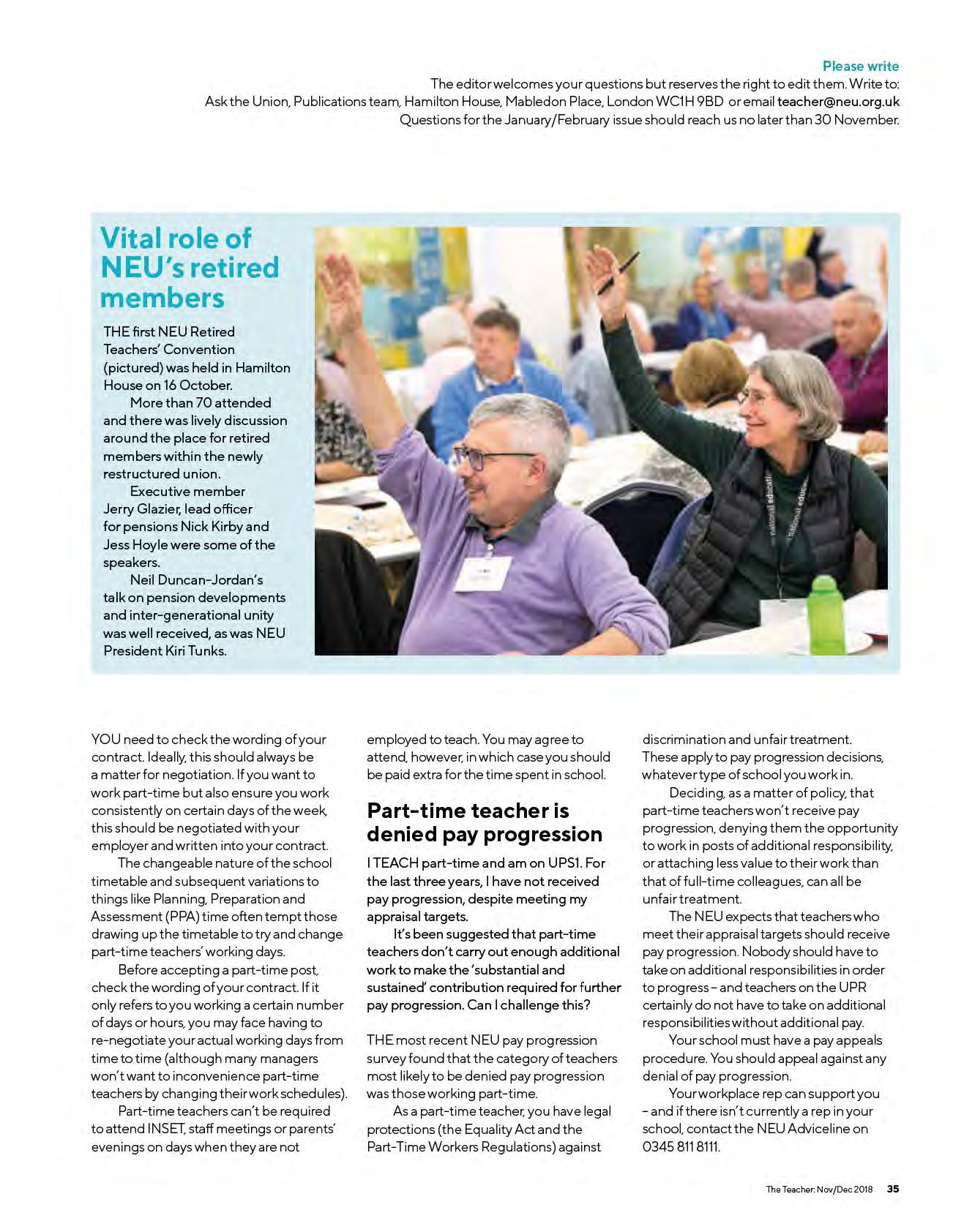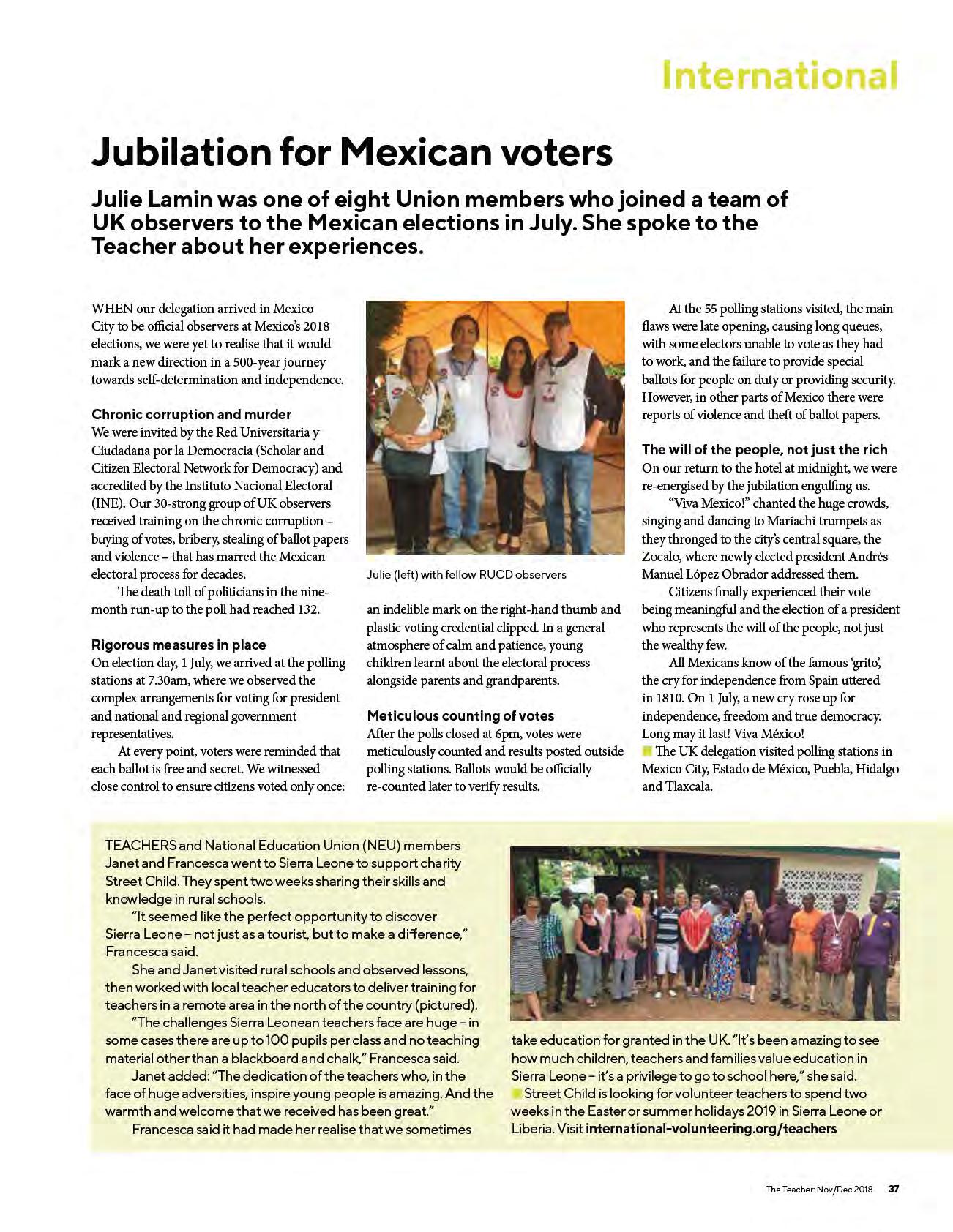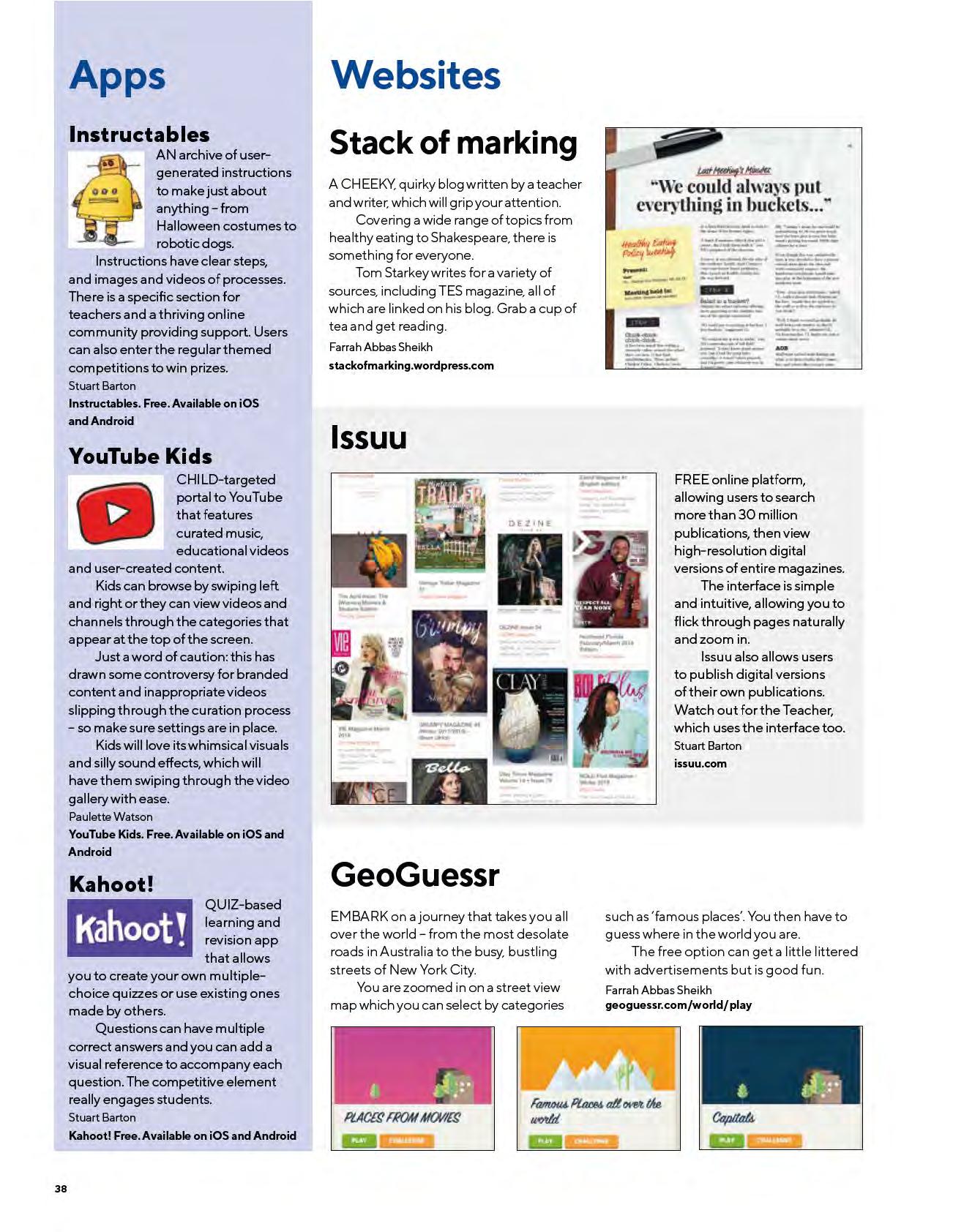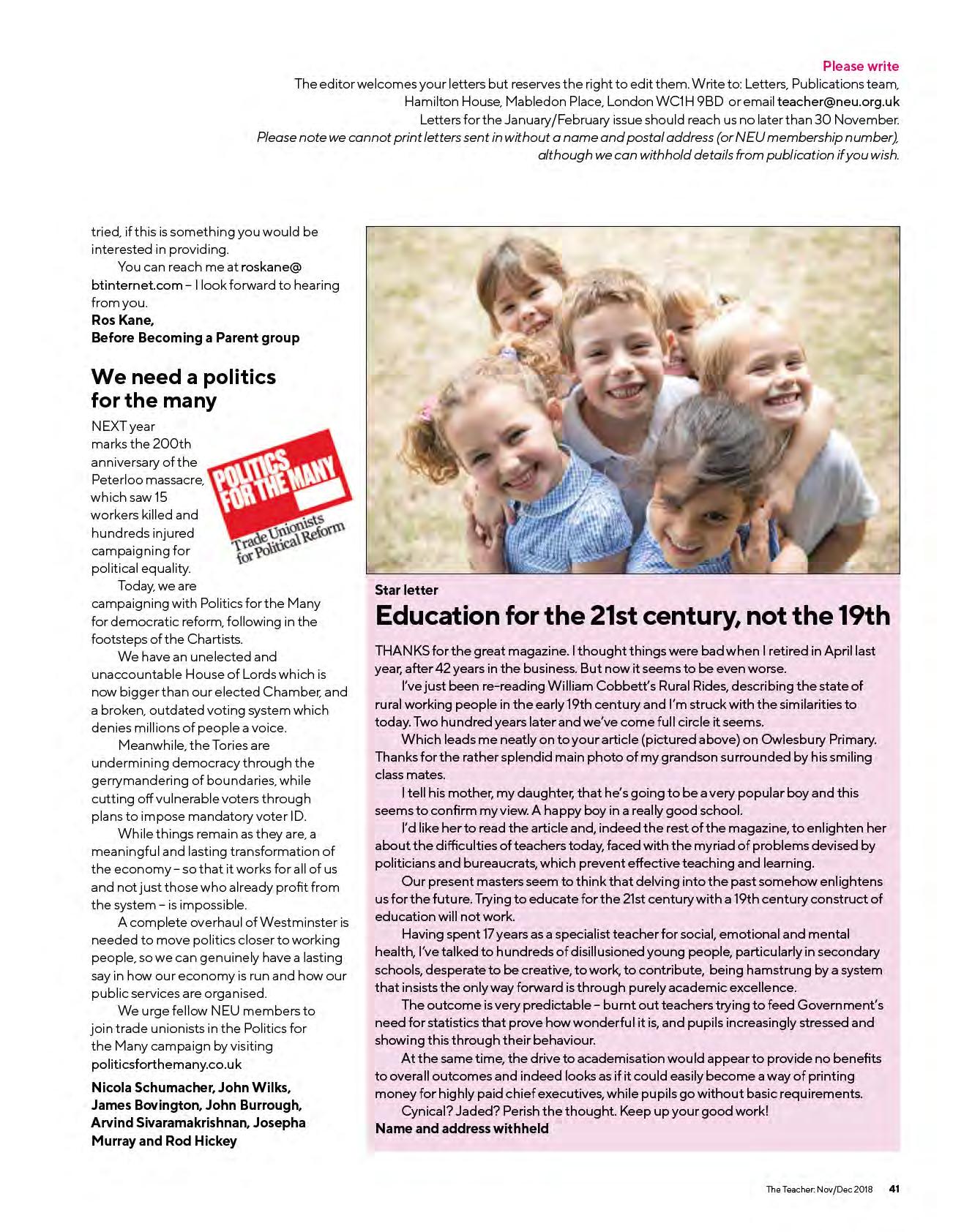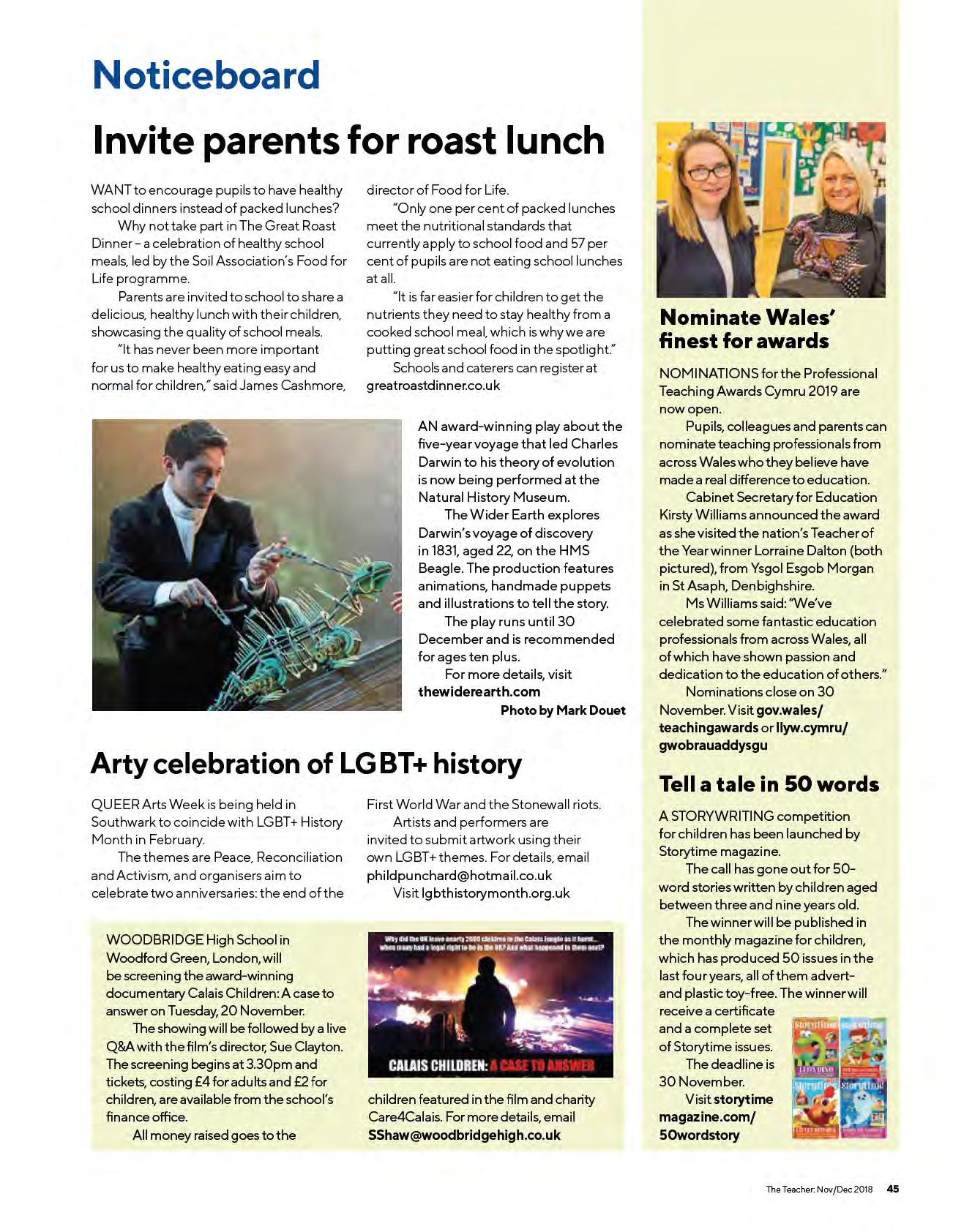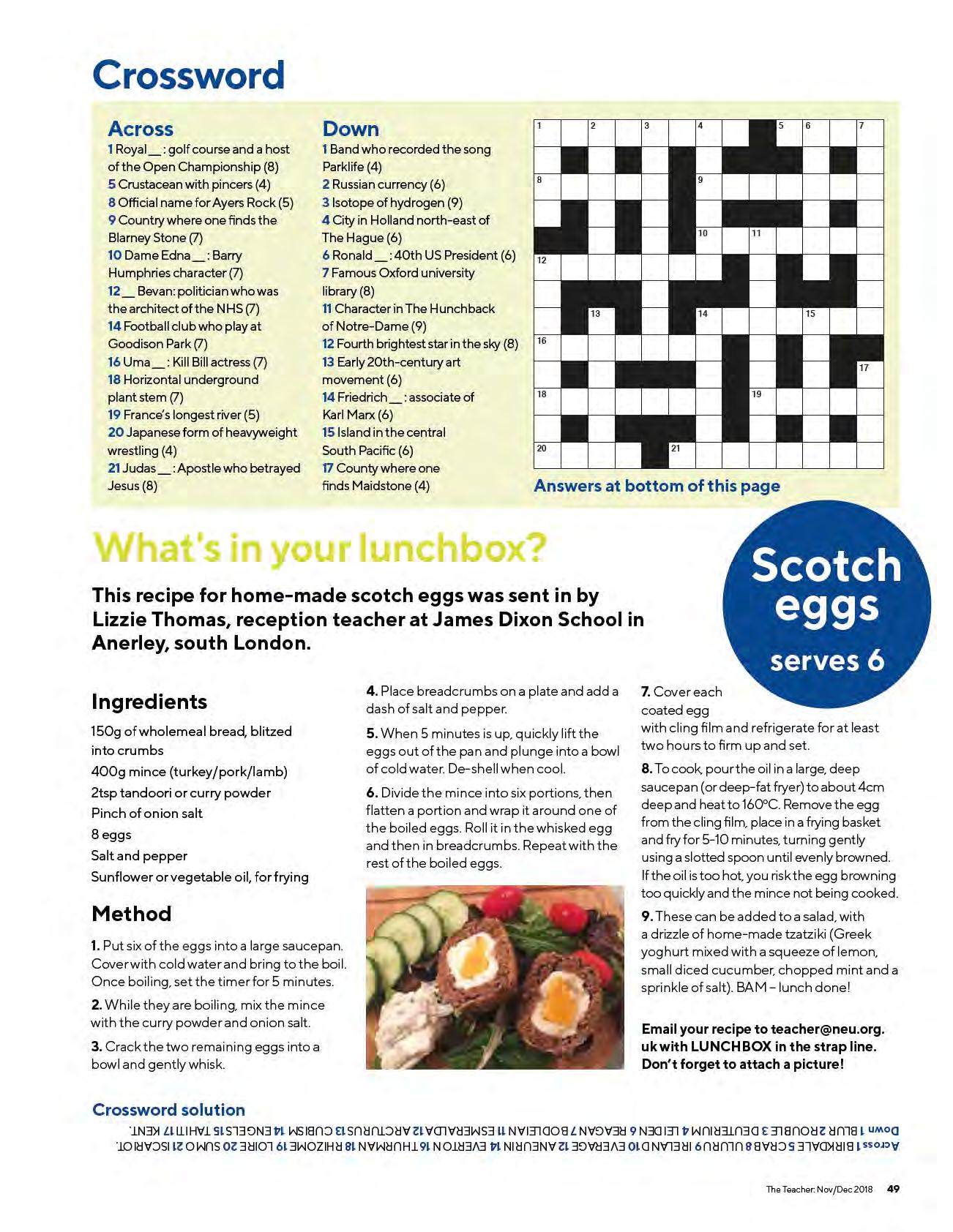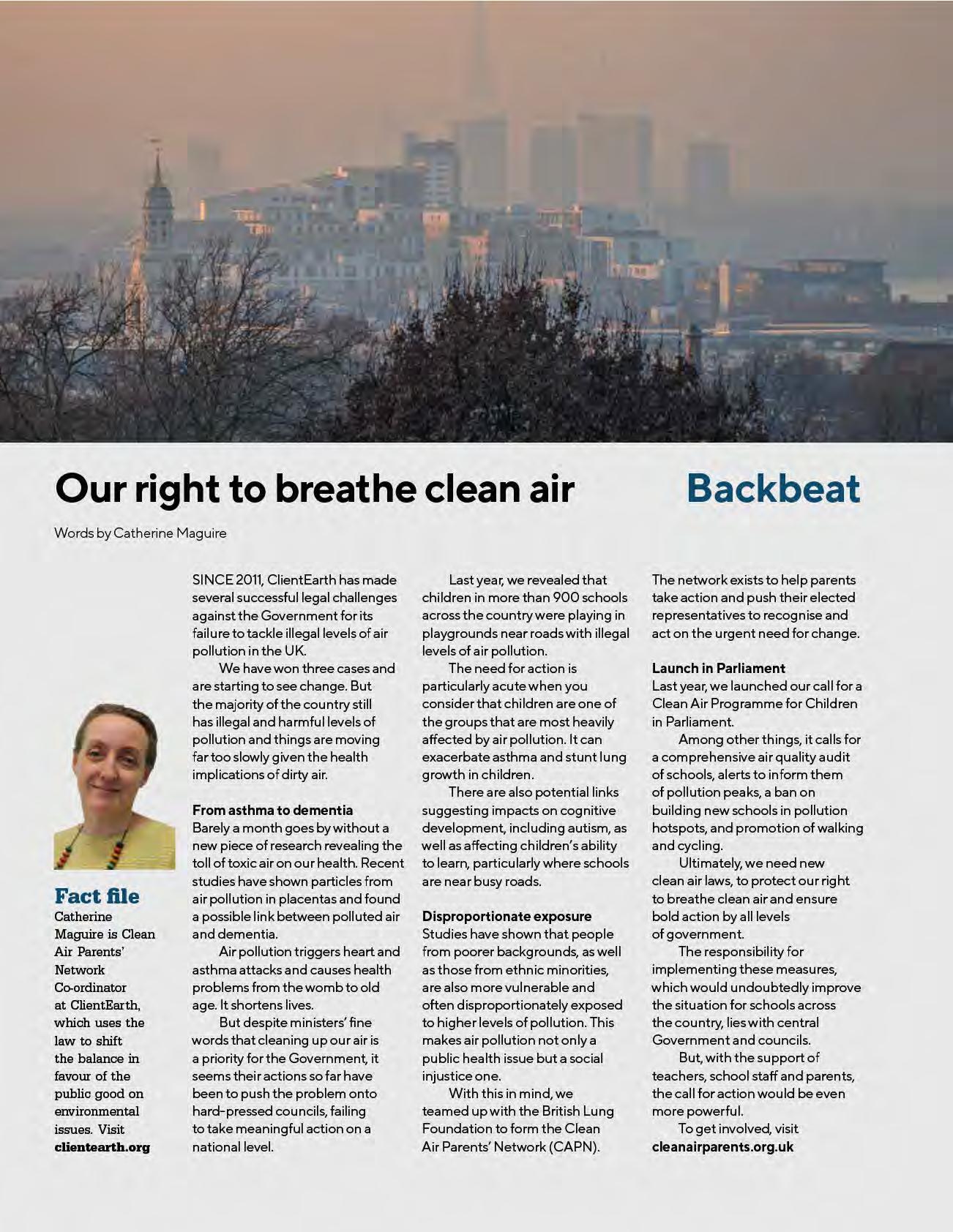
















THE Union made a strong case for Time for Teaching at the party conferences this autumn, reports NEU Parliamentary and campaigns officer Chris Brown.
National Education Union (NEU) stalls highlighted the long hours spent on unnecessary tasks that are driving teachers out of the profession.
Organisers spoke to thousands of people – MPs, teachers, Parliamentary candidates, councillors and school governors – during conference season.
The Union lobbied for better funding to allow heads to afford enough teachers and support staff, and reform of the assessment system which increases many areas of workload.
Addressing politicians from all parties
The NEU held a series of well-attended fringe meetings, welcoming Education Secretary Damian Hinds to the Union’s event at Conservative Party Conference. Layla Moran attended panel discussions at the Liberal Democrat conference, Tracy Brabin at Labour and Vix Lowthion at the Green Party.
Other panellists included Education Select Committee and NEU member Thelma Walker MP, Keeping Early Years Unique and the National Governance Association.
Meetings were also jointly held with the charity Child Poverty Action Group to highlight the impact poverty has on children’s learning and society as a whole.
LibDem and Labour backing
In her speech to the Liberal Democrats’ gathering in Brighton, Layla Moran quoted
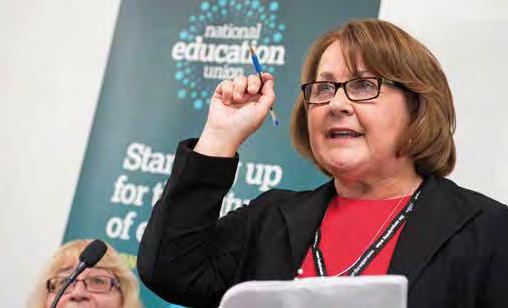
from the Union’s recent exam factories research and re-iterated her party’s commitment to scrap Ofsted and get rid of SATs.
A week later in Liverpool, Angela Raynor announced that a Labour government would create a state-funded teacher supply service, end the academy and free schools programme and bring all publicly funded schools “back into the mainstream public sector, with a common rule book and under local democratic control”.
Damian Hinds’ address to Conservative conference in Birmingham was most notable for the key issues that it failed to address – including school funding, workload and teacher supply.
At TUC Congress in September, NEU:
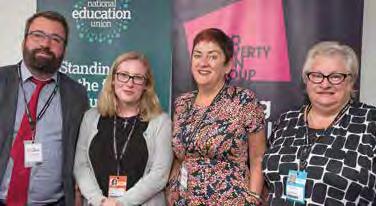
NUT section President Kiri Tunks proposed a motion calling for a fully funded pay rise for teachers.
The TUC motion “supports member unions taking action to secure fair pay in schools and full implementation and funding of pay recommendations”.
Unanimous support for Palestine
A resolution on Palestine, supported by the NUT former President Louise Regan, was passed unanimously.
The motion condemned Israel’s recent passing of a nation-state law, which institutionally discriminates against Palestinian citizens of Israel, as well as Trump’s decision to cut aid for Palestinian refugees.


A WHOLESALE attack on staff contracts, including plans to ditch all national and local agreements, has been announced by the Bradford Diocesan Academies Trust (BDAT).
Eighteen schools in Bradford run by BDAT could scrap pay and conditions agreements contained in the Burgundy Book.
This would impact on sick and redundancy pay. It would also mean probationary periods for all staff changing roles, potentially resulting in dismissal, and national pay rises not being implemented.
The trust admitted: “The proposed changes are intended to give BDAT the right to have the flexibility not to honour the pay rises.”
School staff in all unions – National Education Union (NEU), ASCL, GMB, NAHT, NASUWT and Unison — have mobilised against the proposals.
NEU assistant division secretary Ian Murch said: “We are hopeful that the trust will withdraw this threat. We will move to a more formal dispute if not.”

DISABLED members’ conference in Oxford was a huge success. Delegates took part in workshops covering subjects including invisible impairments, exam stress, autism and making reasonable adjustments to keep disabled members in work.
This was the biggest conference for disabled members yet, with representatives from every region and nation represented.
Comedian Francesca Martinez gave an
entertaining and inspiring opening address challenging the audience to consider what is meant by ‘normal’.
And Janine Booth, of the RMT union, not only delivered the hugely popular workshop on neurodiversity in the workplace, but also treated delegates to her excellent performance poetry.
Three motions were debated and, after lively discussion, it was agreed to
put forward a motion to national conference, promoting job sharing in Union roles as a means of countering discrimination against disabled people and those with caring responsibilities.
Delegates welcomed the longer format, enabling travel to be spread over two days. We look forward to a bigger and even better event next year.
Vin Wynne, senior organiser, disabled members
A CIVIL rights organisation has called for an investigation into a private company which provides home tuition.
Exemplar Education, and sister company The Student Support Centre, provides courses on video and DVD at a cost, and schools send promotional materials out on school-headed paper.
The Association of Pension and Benefits Claimants CIC (ABC) has called on shadow education minster Angela Rayner to ask Trading Standards to examine the company.
High cost of fees, difficulties cancelling a four-year contract, as well as the low quality of videos have all been subject to criticism. Parents on Mumsnet have shared negative experiences of highpressure sales pitches, being locked into a contract and the use of school-headed paper to promote the firm. One user said: “This company has made my life a misery.”
The National Association of Head Teachers has advised its members against distributing sales pitches from private companies.


THE RMT union has been involved in a longrunning dispute to keep guards on trains.
Secretary of State for Transport Chris Grayling has told train companies to introduce driver-only trains, and disputes are ongoing in Northern Rail, South Western Railways, GTR Southern and Merseyrail.
The RMT says train guards are vital to ensuring passengers have a safe, secure and accessible railway. Many teachers are worried that children travelling alone on trains to and from school are vulnerable.
“Guards help passengers in the event of an emergency such as a derailment, evacuation or fire,” said RMT General Secretary Mick Cash. “They provide security and assurance, especially for vulnerable
passengers, help many older and disabled passengers on and off trains and, during their journey, provide expert travel advice.”
Mr Cash said: “Our members are fighting these plans, taking many days strike action and suffering financial hardship. They need your practical and political help.”
The RMT is asking teachers to:
n Donate to the RMT dispute funds – email info@rmt.org.uk or call 0800 376 3706 or visit rmt.org.uk
n Invite a speaker to your Union branch or region or community group.
n Write to your MP using the model letter on the RMT website.
n Share the RMT film ‘Unguarded’ at bit.ly/unguardedrmt
SCHOOLS in Guernsey are ending 11-plus selection exams and moving to comprehensive schooling, after a successful campaign run by local teachers.
National Education Union rep and primary school teacher Connie Armstrong campaigned for the change with secondary school teacher Sara Buck, a NASUWT member, and grandparent Tim Langlois.
The trio organised a survey of teachers and support staff, which gained an overwhelming majority to end selection.
“We had a lot of support from parents,” Connie told the Teacher. “It was a real community effort. Some of the students got involved too which was great.”
Local politicians claimed that teachers and parents were divided on the issue but research showed otherwise. The States of Guernsey (the island’s parliament) then organised its own survey, which led to a vote to end selection by 2019.

THE Union’s work in tackling sexism was discussed at a one-day conference in Wales.
Held on 6 October, the event featured a variety of speakers including Ros McNeill, the Union’s head of education and equality policy, and Dr Jackie Jones, professor of Feminist Legal Studies at Bristol University.
Ros pointed out that many Welsh schools are tackling sexism creatively, while Jackie spoke of the ‘jock culture’ that pervades universities.
Mairead Canavan, NEU division secretary for Vale of Glamorgan, gave a presentation on ‘unions challenging stereotypes’ which showcased booklets produced by the NUT section, including Stereotypes Stop You Doing Things; Boys’ Things and Girls’ Things?; and It’s Child’s Play.
There were workshops from Let Toys be Toys, The Women and Girls Network and Show Racism the Red Card (Wales).
Sally Thomas from the Union staff team spoke about the NEU Sexism in Schools report and what teachers can do to tackle sexual harassment.
Participants really enjoyed the day and hope to organise more events on tackling sexism in future.
THE NEU has a new discount savings scheme provider. The current arrangement the NUT section has with Countdown will come to an end on 31 December.
If you have a standing order payment set up with your bank for gift cards provided through the scheme, don’t forget to cancel it by the end of the year.
Your gift cards will continue to be usable provided there is a balance on the card.
If you have any queries, contact customerservices@countdowncard. com or telephone 01462 889 010.
More details will be provided with your membership renewal letter in the New Year.

Music for Youth is a national charity that provides young people with unique performance opportunities. The Teacher spoke to chief executive Judith Webster about its work, her passion for music and plans for the future.

MORE than 40,000 young people take part in Music for Youth’s (MFY) programme of regional events between January and April every year. This is followed by a national festival in summer and ends with three Proms at the Royal Albert Hall in November.
According to the charity’s chief, Judith Webster, the concerts are “life-changing” for the children taking part.
Professional crews and superstar casts
“The performances are really special,” she says. “We have a professional production crew and stage management. They’re treated like superstars.”
Students and teachers find it “motivational” coming together and witnessing “good practice rather than all the stresses and
strains they have to navigate on a daily basis,” Judith tells the Teacher.
“Music is a vehicle for self-expression and communication but there are so many benefits to being involved in music-making that go way beyond the skills required in learning to play an instrument,” she says. These include social and life skills, working in teams and thinking creatively.
While MFY works with orchestras, choirs and classical music, it also accommodates contemporary music – urban, electronic, rock and indy.
With its 50th birthday coming up in 2020, the charity will not only celebrate its achievements but also roll out new
programmes “reflecting how young people are creating, performing and consuming music today”.
And children and charity partners love the good news stories. The NUT has been a longstanding partner of MFY and groups regularly perform at Union events.
Free and open to everyone
Young people thrive on the chance to perform, and music teachers – who are often isolated in tiny departments – benefit from coming together.
Judith is keen to emphasise the importance of diversity and inclusion –all the charity’s programmes are open access and free.
To apply, visit mfy.org.uk


SCHOOLS up and down the country took part in Wear Red Day on 19 October. Members, parents and pupils wore red to show their support for the Show Racism the Red Card (SRtRC) campaign, which is supported by the Union. The charity has been campaigning against racism by using high-profile football personalities since 1996 and has an educational programme which delivers anti-racism training to more than 50,000 people every year. Our picture shows pupils from Park View Secondary School in Tottenham, London. Visit theredcard.org for more details. n Tweet your photos, using the hashtags #Showracismtheredcard and #WearRedDay, and they may appear on the SRtRC annual calendar.
YORKSHIRE and Midlands Black Teachers’ Network and Leeds National Education Union organised its first ever Challenging Racism conference in Leeds.
The proportion of Britons who admit to being racially prejudiced has risen since the start of the millennium, raising concerns that growing hostility to immigrants and Islamophobia are setting back community relations.
Religiously motivated hate crime has risen 40 per cent in England and Wales, with more than half (52 per cent) directed at Muslims, according to the Home Office.
As a trade union activist, I have
CAMPAIGN group Stand up to Racism has called a national unity demonstration against the rise of the far right.
The protest takes place on 17 November in central London and has the backing of the Union.
The organisers said: “We are facing the biggest rise in support for fascism, racism, Islamophobia and antisemitism since the 1930s. We invite all those who want to build a mass movement against the far right on the streets, in workplaces, on campuses and in our communities to join us.” Visit standuptoracism.org.uk
participated in many forums within the educational field. The overwhelming concern was the lack of provision, support and knowledge about how to deal with all forms of racism, specifically Islamophobia.
Our conference heard from speakers such as Maz Saleem, whose father was murdered by a fascist thug. Others spoke about challenging a Eurocentric curriculum.
NEU Joint General Secretary Kevin Courtney and President Kiri Tunks both spoke about challenging xenophobia and racism.
By Kauser Jan, Leeds NEU
THE first Northern NEU Equalities Conference took place in York at the end of the summer.
Special guests offered perspectives on sexism in schools and barriers faced by Black and disabled teachers. Members enjoyed workshops on subjects from the language of equality to using spiritual, moral, social and cultural development to embed equalities policies and practices.
Delegates heard from speakers, developed action plans and resources, networked with other teachers and gathered a better understanding of issues
and attitudes affecting members.
The conference was designed to promote the support the Union gives and to help develop strategies for delivering a fairer education in the north.
And we’ve already seen some positive results. Delegates from Northumberland have joined the Changing Places campaign, South Tyneside has set up round table events on Sexism in Schools and our thriving LGBT+ network has organised a programme of events for the year.
Email northern@neu.org.uk
By Nik Jones
On 1 January, the ATL and NUT sections of the Union will cease to exist and you will see some changes to your membership. Matt Partridge explains.
AT the start of 2019, a new era begins for the National Education Union (NEU) when the combined membership of both our Union’s sections formally become one.
The future looks exciting, as we become one effective and powerful voice, championing everyone who works in education.
But in the short term, there will be changes to your membership and we’d like to keep you informed about them.
The NEU membership year is an academic year, from 1 September to 31 August.
The NUT membership year ran from January to December, so an interim ‘short’ year is needed to move your membership to the new cycle.
From 1 January, former NUT members will enter a one-off, eight-month ‘year’. Then, from 1 September 2019, all members will go into a full 12-month membership year, ending 31 August 2020.
A consequence of a short membership year is that eight months of subscriptions will be collected over a shorter, six-month period. Your Direct Debit will be collected from 1 February to 1 July and you will see a change in your monthly instalment amounts.
Rest assured, the total amount for those eight months is an exact pro-rata of NEU membership rates.
You will receive a full breakdown of your subscription for January to August, along with your new membership card, at the end of December.
For members in work, your membership type and subscription rate are based upon your role and hours at work. Members will be leadership, standard (teacher or lecturer) or support.
For the latest information on rates visit neu.org.uk/join/membership-rates

Some members may be notified by their bank about a new NEU Direct Debit mandate. This is nothing to worry about.
This means that, from 1 February, you will now see National Education Union appear on your Direct Debit instruction.
Changes to specific groups of members
Leadership staff
Leadership members will have their own section and be given opportunities to self-organise, develop policy and access bespoke support and publications.
To support this and to reflect salaries in education, NUT members in leadership roles will move into leadership membership and pay a higher subscription.
Support staff
Any NUT members carrying out a support staff role are entitled to move into support membership, which will mean a reduction in their annual subscription rate.
Supply staff
NUT supply teacher members should see no change to their subscription amounts until 1 September 2019 after which, as with all NEU members, membership rates will be calculated according to hours worked.
Retired members
Retired members of the NEU will continue to play a vital role in much of the Union’s work. Retired membership is set at £20 per annum with no local fee payable.
n To find out more, visit neu.org.uk/join
IT’S vital that the NEU has up-to-date details for all its members.
You may be eligible for reduced subscriptions – for example, if you work part-time, are about to retire or take maternity leave.
It is also important you update your equalities information.
Have you moved? Please tell us your new home or school address:
n visit teachers.org.uk/update (for NUT section members)
n call us on 0345 811 8111 (MondayFriday 9am-5pm)
n email membership@neu.org.uk
n or write to Membership & Subscriptions, National Education Union, Hamilton House, Mabledon Place, London WC1H 9BD.

Louise Moores is a primary school teacher in Middlesbrough and assistant divisional secretary and campaigns officer for the Union. She is also the northern representative on the disabled teachers’ national organising forum.
What do you love about teaching?
I love the children’s imaginations and acceptance of each other. Adults could learn a lot about how to treat each other from children.
What do you love about being in the Union?
The inspirational people I’ve met and the friendships I’ve made along the way. I’ve been places and done things I would never have imagined, like speaking at conference and the TUC, and lobbying MPs.
What have you been up to lately?
Union-wise, I have supported Pride events in the north, attended the Durham Miners’ Gala and dressed as Cinderella (pictured) to inform parents about the Union’s campaign against baseline testing.

I have also been part of the northern equalities working party that organised a conference in June, and am currently working on a project to encourage disabled teachers to self-identify to the
Union. Yesterday I submitted a motion to Disabled Teachers’ Conference regarding reasonable adjustments to executive roles within the Union.
What’s important to you right now?
My family, especially my two boys.
What do you do on your day off?
My husband would probably say ‘Union stuff’ but when I’m not out with banners and petitions, I like to spend time with my family, walking the dog on the beach or in the woods.
Tell us something that we don’t know
Before teaching, I was a librarian and briefly an archaeologist. I was once personal assistant to Dr ‘Bones’ Jones from Channel 4’s Time Team.
Chris Bartley, NEU rep at St Joseph’s Roman Catholic Primary in Middlesbrough, reports on his mission to improve the wellbeing of pupils.
I’D read about the Daily Mile initiative, where children run or walk a mile every day to improve their wellbeing and learning outcomes.
Run to Russia!
Flushed by the excitement of the impending World Cup, I had a crazy idea –St Joseph’s would run the 2,624 miles to Russia.
Taking a trundle wheel round the key stage 2 playground, I calculated it would take 13 laps to run or walk one mile.
I asked our head if it was possible to have a Daily Mile at 8.30am every day. She agreed and we challenged the school community to reach Russia before England played in Volgograd on 14 June.
On the first morning, we invited Roary (pictured), the mascot for Middlesbrough Football Club, to our grand opening and we had a fantastic turn out of 148.

We were now 148 miles towards our target and I feared people might see it as a one-off. But we got roughly the same figure every day and some parents told me that children who struggled to get out of bed were now itching to run a mile.
As we got closer to England’s opening game, we still needed 202 miles to reach Russia. We sent a text encouraging as many people to turn up as possible and on 14 June, 212 turned up.
As a PE co-ordinator, it’s been one of the most life-affirming projects I have ever
been involved in. Some people run fast, some slow and some walk. But everyone starts their day with exercise and a chance to talk about the day ahead.
Next stop: St Joseph’s runs the world
In my wildest dreams, I never expected the levels of participation – or the step count on my Fitbit – to be so high.
In September, we started Running the World, where we will attempt to walk and run 24,900 miles to circumnavigate the globe. We’ll keep you posted.


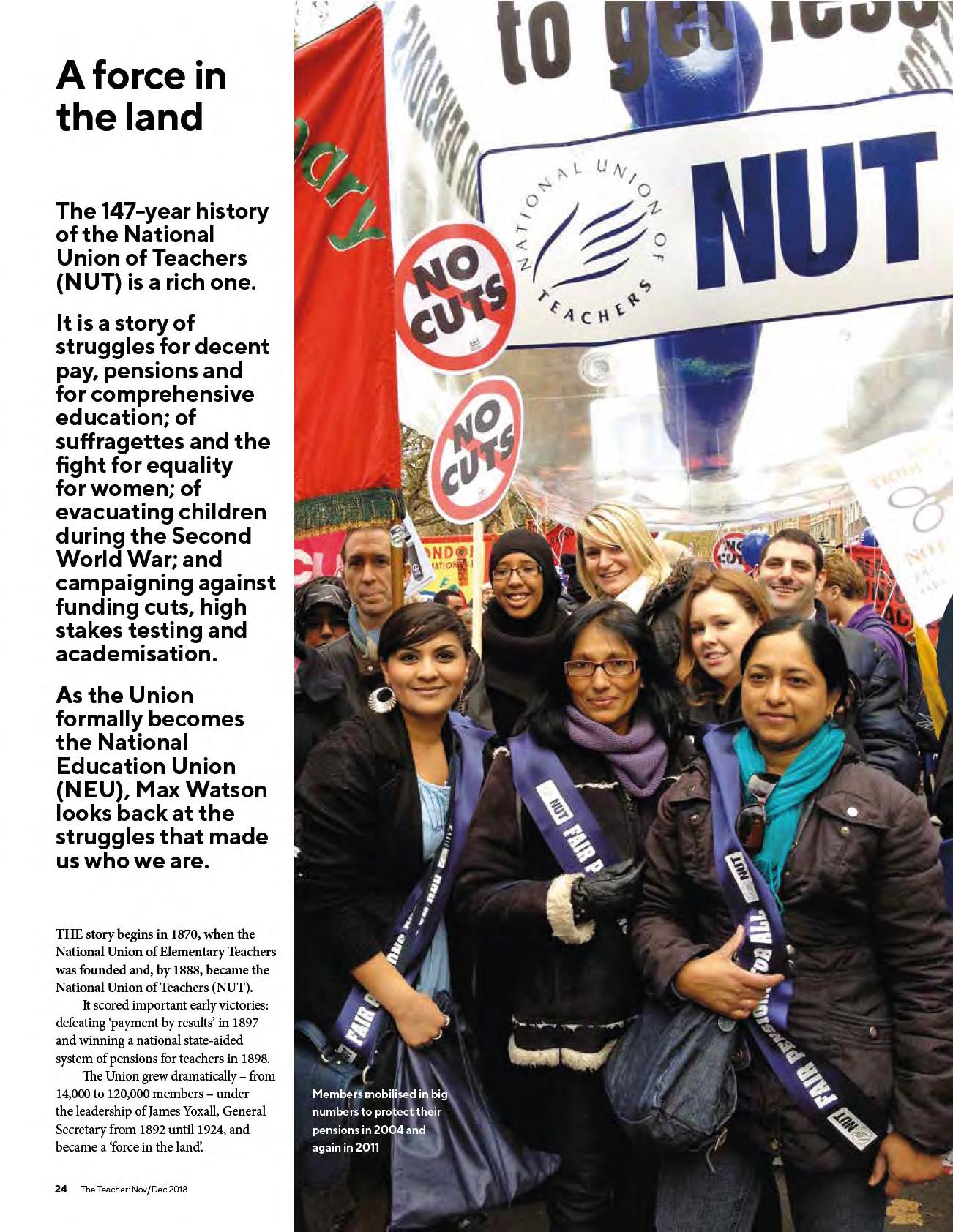
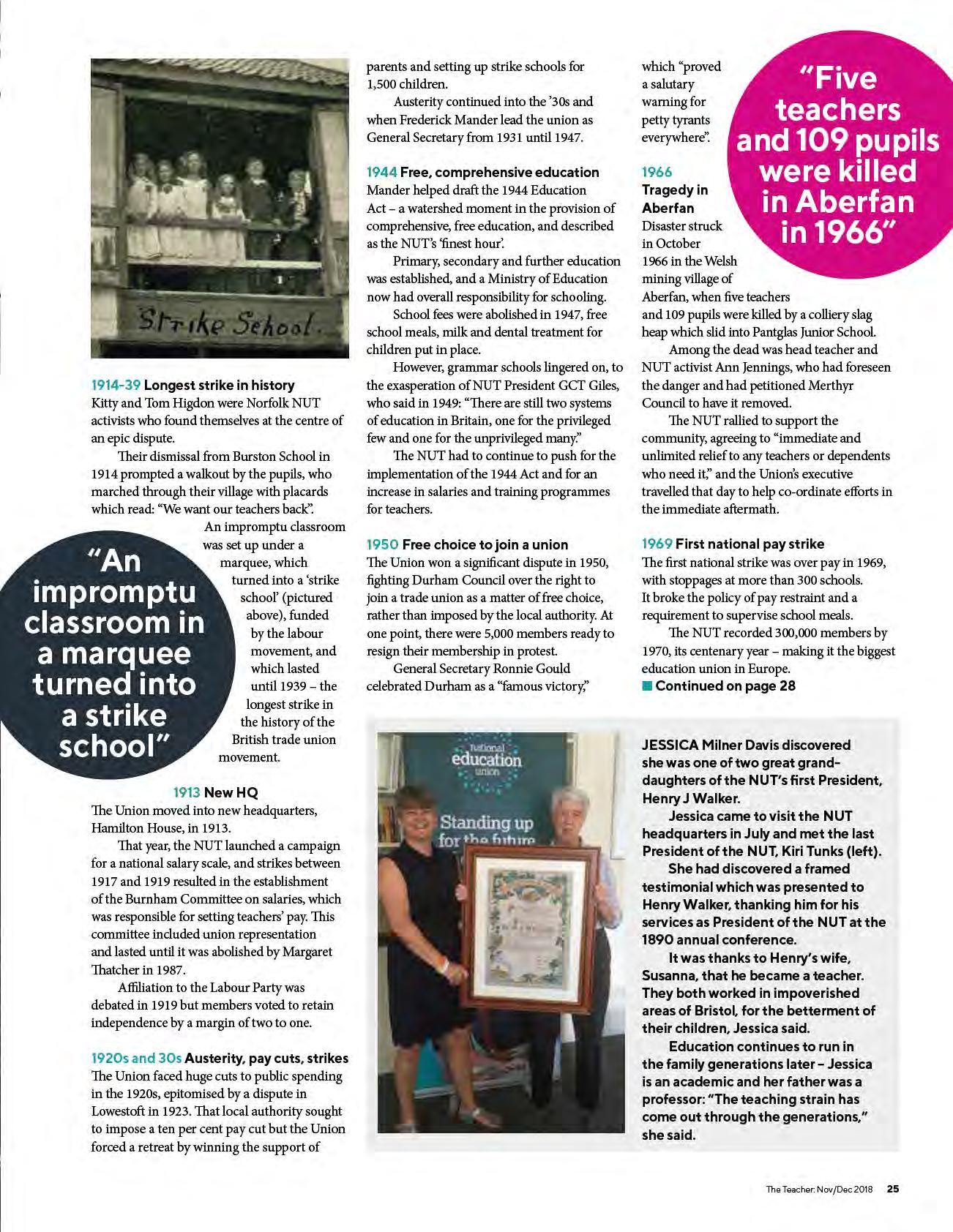
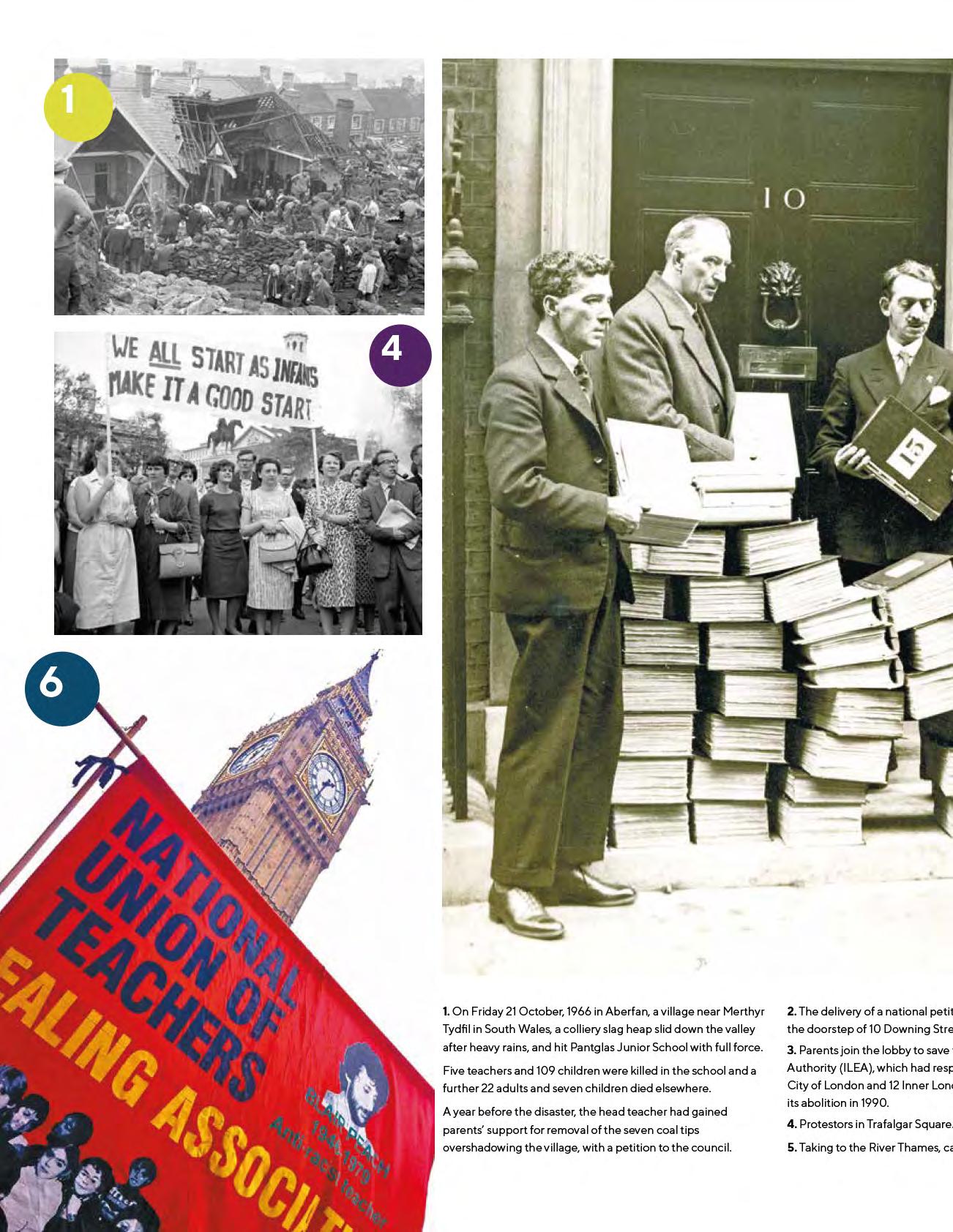
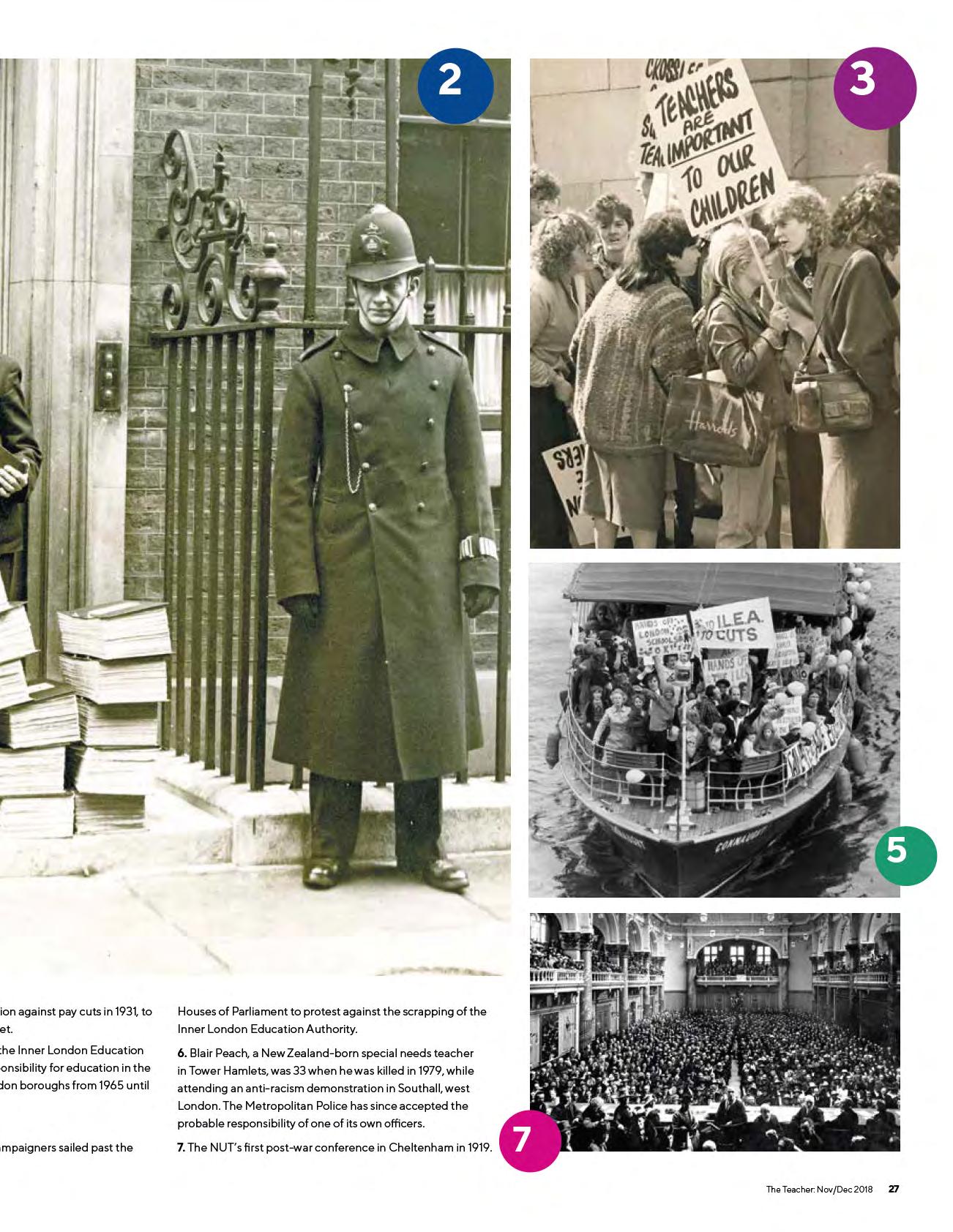



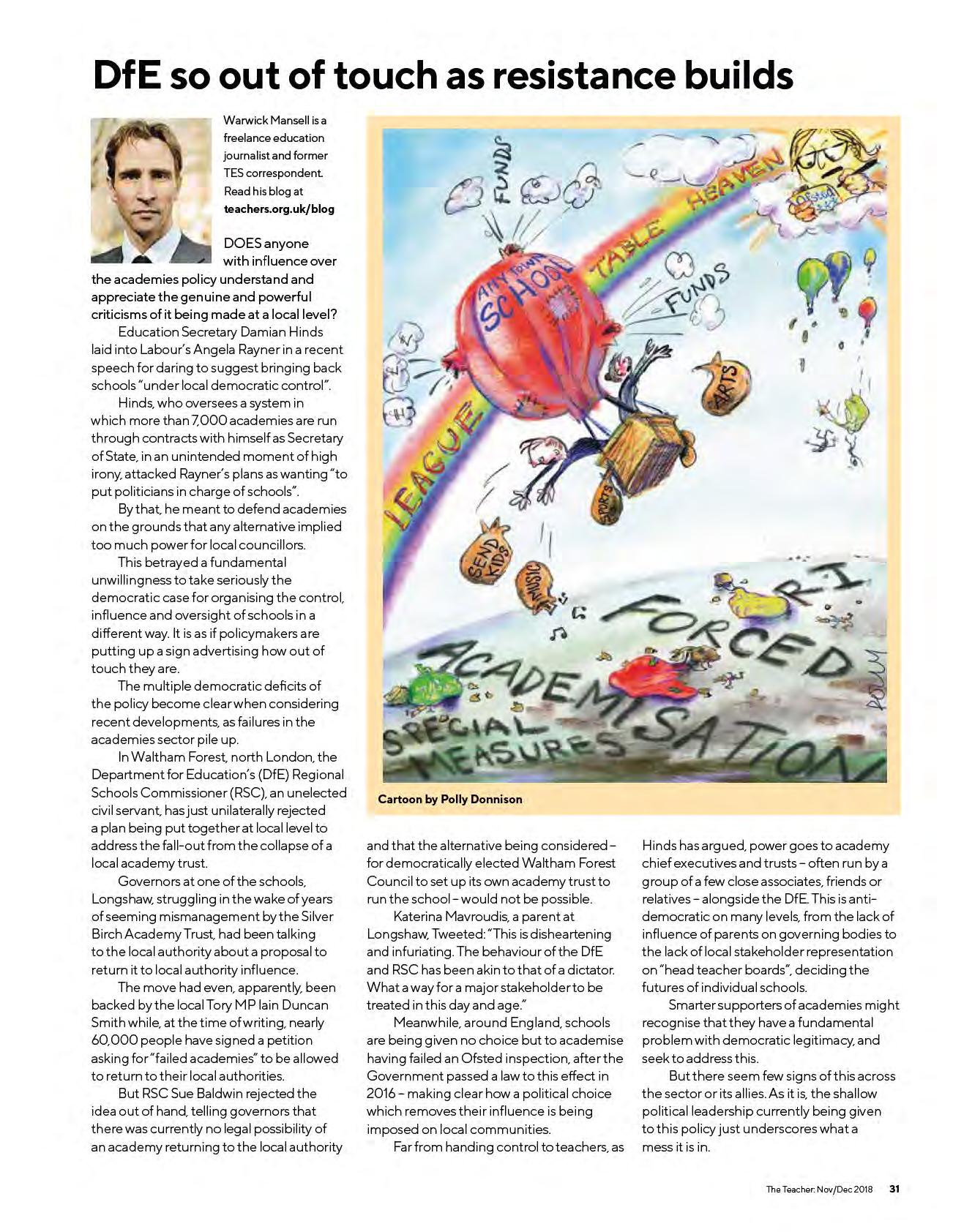

A level biology teacher Dr Richard Spencer was the recipient of two national awards for teaching. Emily Jenkins finds out what makes him a class act.
DR Richard Spencer – or ‘Doc’ as his students call him – has managed to scoop not one, but two national awards for excellence in teaching of science, technology, engineering and maths (STEM).
Already a finalist in the 2015 Global Teacher prize, this year he was awarded both the ENTHUSE Award for Excellence in STEM Teaching and the Royal Society of Biology’s Secondary School Biology Teacher of the Year 2018.
He believes the secret to success is enthusiasm.
‘Lack of enthusiasm can kill a topic’
“It’s the most important thing,” says Richard. “If you’re not enthusiastic, it can kill a topic. I try to make sure I never teach anything just because it’s on the exam. I will try and find an interesting way of doing something that makes it relevant and topical. It’s not always easy but I enjoy the challenge and like being creative.”
Creativity is at the centre of teaching for Richard and he often brings music and dance into lessons.
“A couple of years ago, I wrote a song about the heart and circulation to the tune of ‘Heads, shoulders, knees and toes’ and got the students to sing it. The song ended up winning a competition called O2 Learn. I’ve heard pupils singing it in other schools now and I’m like – I wrote that!” he laughs.
As much as his lessons are filled with music, Richard is keen to point out that he does a lot more as a teacher than write songs. He improves his knowledge by going on international trips to conferences or taking part in continuing professional development (CPD) training and educational projects.
He is currently part of the Erasmus Plus project, funded by the European Union, which involves nine countries working together to create resources on the teaching of design with STEM subjects.
“I find design absolutely amazing,” Richard tells me. “It’s something I knew
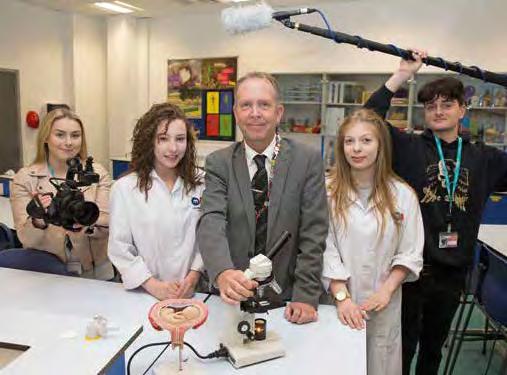
nothing about. But I’ve been visiting schools in different countries and it is seen as a vocational skill and highly regarded.
“At the moment, we’re looking at the topic of tattoos. It’s fascinating from a design point of view but there’s some really interesting biology. I’ve just devised a practical that simulates the uptake of the ink by white blood cells.”
Richard makes sure that everything he does can be brought back to his students. He enters them for awards too – they were shortlisted for the StarT Education Award after they wrote, acted, narrated, filmed and edited a drama in their biology class about paternity tests.
It has since earned Middlesbrough College recognition from the LUMA Centre Finland – an organisation that promotes STEM subjects internationally.
Richard adds: “I’m incredibly proud of them. The drama is thrilling and shows what you can create with biology classes.”
Union membership is also important to Richard. “I have been a member of the NUT all my teaching career,” he says.
“Although membership has many benefits, the main reason is that I wholeheartedly support our determination to fight for a fairly funded education system, with highly trained and qualified teachers and educational professionals who have manageable workloads, fair pay and good working conditions.”
Richard has been teaching in sixth form colleges for 27 years and continues to be incredibly passionate about what he does.
“I love to keep learning, trying new things and being creative, and I think my students do too,” he says.
“My little motto is: variety is the spice of life-science!”
If you know someone who’s a class act, email details to teacher@neu.org.uk
